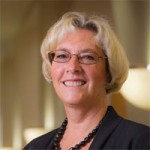This article is more than 5 years old.
Chelcie has already reported on her experience at the Coalition for Networked Information in St. Louis, so I will add my version. One of my goals for this series of biannual meetings is to introduce the talents of our librarians to the national community of library and IT people. Last year it was Kyle and ZSRx. This year it was Chelcie and her work with the Digital Public Library of America. She did a splendid job, I can attest. She and her co-presenter had communicated beforehand and coordinated their presentations. People were lined up afterward to talk to both of them, including DPLA founder, Dan Cohen.
The CNI meeting itself started with a conversation between CNI Executive Director Cliff Lynch and his guest, Bryan Alexander, Senior Fellow National Institute for Technology in Liberal Education. They first started talking about MOOCs, always of interest to me, and Alexander said while there are still plenty of challenges, he sees them in the Gartner hype cycle as coming out of the trough of disillusionment and starting up the slope of enlightenment. He also saw a place for them in the world of libraries and museums (yay for ZSRx!), saying they had good content to offer and it would give them good publicity.
I went to a program on “Fostering a graduate research community with digital scholarship programs and services,” because I am always looking for ways to strengthen our support for graduate research. The University of Oregon invented an interdisciplinary New Media and Culture certificate program that counts as a transcripted credential but adds no more to the time of degree completion. Ingenious.
“Four Questions You Should Never Ask in Evaluation/Assessment in Libraries and IT, and a Number of Questions that You Should!” was a fun talk on assessment (or as fun as assessment can be). We were cautioned against ambiguous questions, double-barreled questions, substituting usage for quality, over-emphasis on statistical significance, and both overpowering and underpowering a test.
Another useful session on assessment was “Assessment of e-book strategies.” Claremont College did a study of ebook usage for texts that were on reserve. They found that high usage while on reserve justified their purchase for their entire shelf life (might we try e-book format for our own Textbook Collection??). University of Richmond found that usage was highest in the social sciences. Long-form reading is discouraging in the humanities and law. Their DDA usage led to a drop in firm orders, which would probably happen here if we did not actively seek to prevent it. Lafayette College had policies and practices similar to ours and found that DDA costs were less than print costs.
The one program I wanted to attend but did not was “Transforming Community with Strategic Social Media.” I noticed it because the speakers were from Montana State University, where our own WFU alum Nilam Patel found a job this fall as a social media strategist. I went and introduced myself after their talk and then found their slides on the outstanding Twitter feed that Chelcie mentioned. We should study their success and learn from them.
During my stay, I also toured Washington University St. Louis where my long-time friend and colleague Jeff Trzciak is the University Librarian. It is a beautiful library on a beautiful campus. On Monday night, Chelcie and I attended a dinner for Wake Forest parents and alumni, arranged by one of the regional officers in Advancement. It was a good group and we made several contacts that we will pursue. So, all things considered, it was a very good trip!


3 Comments on ‘Lynn’s version of CNI in St. Louis’
Sounds wonderful from beginning to end
I need to know the four questions not to ask on an assessment!(and assessment is VERY fun!)
Interesting stuff on assessment. Its a little hard to unpack the results from the slides, but they were asking exactly what I want to ask on the e-books assessment. We’ll have to investigate the ability to get e-textbooks.